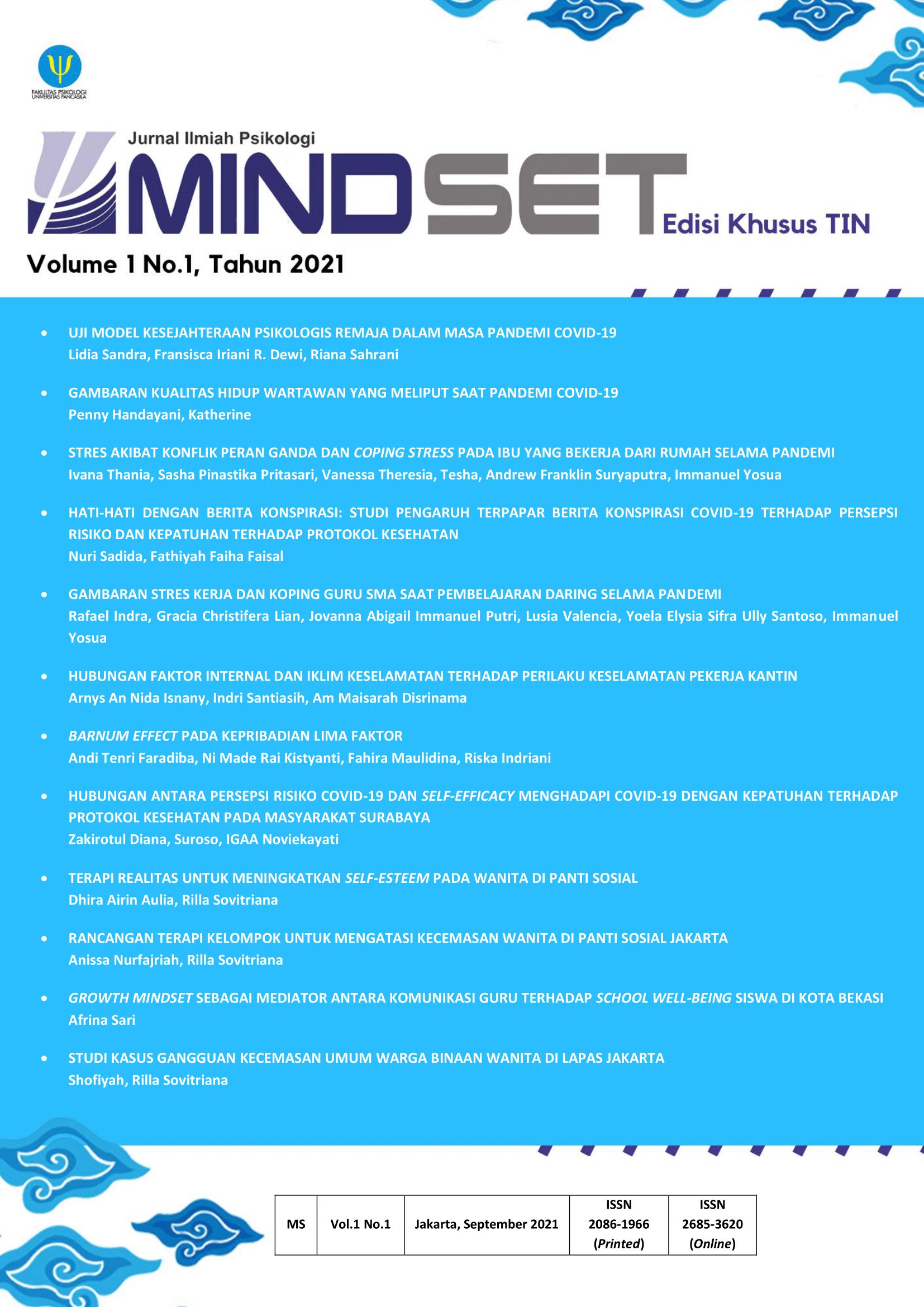Hati-Hati dengan Berita Konspirasi: Studi Pengaruh Terpapar Berita Konspirasi COVID-19 terhadap Persepsi Risiko dan Kepatuhan terhadap Protokol Kesehatan
DOI:
https://doi.org/10.35814/mindset.v1i01.2591Keywords:
adherence to health protocol, COVID-19 conspiracy, exposed to social media, risk perceptionAbstract
Until 2021, the COVID-19 epidemic has shown no indications of fading in Indonesia. On the other hand, there is a growing amount of talk on social media concerning COVID-19 being a hoax. The distribution of information regarding COVID-19 as a conspiracy is considered to have weakened public perceptions of risk and cooperation with health regulations, potentially delaying the end of the pandemic in Indonesia. As a result, the goal of this study was to determine the impact of COVID-19 news exposure on risk perception and adherence to health protocols. This study used an experimental research approach that was carried out via online media. A total of 112 people were recruited as participants, all of them were young adults. The findings of this study show that participants who were exposed to news of the COVID-19 conspiracy, i.e., those in the experimental group, had a lower risk perception than those who were not exposed to news of the COVID-19 conspiracy or those in the control group (U=1997.5, P=.011). Furthermore, risk perception has a substantial favorable link with adherence to health procedures, according to this study. This indicates that someone who has heard of the COVID-19 conspiracy has a lower risk perception, and that someone with a lower risk perception is less likely to follow health protocols. The essay goes into greater detail on the implications and limitations.
References
Abrams, D. (2010). Processes of prejudice: Theory, evidence and intervention. In Equality and Human Rights Commission.
An, L., Hawley, S., Van Horn, M. L., Bacon, E., Yang, P., & Resnicow, K. (2021). Development of a coronavirus social distance attitudes scale. Patient Education and Counseling, 104(6), 1451-1459. https://doi.org/10.1016/j.pec.2020.11.027
APJII. (2017). Penetrasi dan perilaku pengguna internet Indonesia.
Awan, I., & Zempi, I. (2015). We Fear for our Lives: Offline and Online Experiences of Anti-Muslim Hostility.
Ben-David, A., & Matamoros-Fernández, A. (2016). Hate speech and covert discrimination on social media: Monitoring the Facebook pages of extreme-right political parties in Spain. International Journal of Communication, 10.
Copsey, N., Dack, J., Littler, M., & Feldman, M. (2013). Anti-Muslim Hate Crime and the Far Right. In Centre for Fascist, Anti-Fascist and Post-Fascist Studies.
Darker, C., & Whittaker, A. C. (2018). Risk Perception. In M. Gellman (Ed.), Encyclopedia of Behavioral Medicine (hal. 1-3). New York, NY: Springer New York. https://doi.org/10.1007/978-1-4614-6439-6_866-3
Ding, Y., Du, X., Li, Q., Zhang, M., Zhang, Q., Tan, X., & Liu, Q. (2020). Risk perception of coronavirus disease 2019 (COVID-19) and its related factors among college students in China during quarantine. PLOS ONE, 15(8), 1-13. https://doi.org/10.1371/journal.pone.0237626
Dryhurst, S., Schneider, C. R., Kerr, J., Freeman, A. L. J., Recchia, G., van der Bles, A. M., … van der Linden, S. (2020). Risk perceptions of COVID-19 around the world. Journal of Risk Research, 23(7-8), 994–1006. https://doi.org/10.1080/13669877.2020.1758193
Gharpure, R., Hunter, C. M., Schnall, A. H., Barrett, C. E., Kirby, A. E., Kunz, J., ... Garcia-Williams, A. G. (2020). Knowledge and practices regarding safe household cleaning and disinfection for COVID-19 prevention-United States, May 2020. Am J Transplant, 20, 2946-2950. https://doi.org/10.1111/ajt.16300
Hameleers, M., & van der Meer, T. G. L. A. (2020). Misinformation and Polarization in a High-Choice Media Environment: How Effective Are Political Fact-Checkers? Communication Research. https://doi.org/10.1177/0093650218819671
Haryanto, A. T. (2019, Mei). Marak Ujaran Kebencian, Kepala BSSN: Masalah Etika. DetikInet. Diambil dari https://inet.detik.com/cyberlife/d-4568061/marak-ujaran-kebencian-kepala-bssn-masalah-etika
Heller, B., & Magid, L. (2018). Combating hate speech. Diambil dari connectsafely.org website: https://www.connectsafely.org/wp-content/uploads/2019/10/qg-hatespeech.pdf
Iorfa, S. K., Ottu, I. F. A., Oguntayo, R., Ayandele, O., Kolawole, S. O., Gandi, J. C., & Olapegba, P. O. (2020). COVID-19 knowledge, risk perception, and precautionary behavior among Nigerians: A moderated mediation approach. Frontiers in Psychology, 11, 3292. https://doi.org/10.3389/fpsyg.2020.566773
Jolley, D., & Douglas, K. M. (2014a). The effects of anti-vaccine conspiracy theories on vaccination intentions. PLOS ONE, 9(2), e89177. Diambil dari https://doi.org/10.1371/journal.pone.0089177
Jolley, D., & Douglas, K. M. (2014b). The social consequences of conspiracism: Exposure to conspiracy theories decreases intentions to engage in politics and to reduce one’s carbon footprint. British Journal of Psychology (London, England: 1953), 105(1), 35–56. https://doi.org/10.1111/bjop.12018
Kemkominfo. (2020). Survei Literasi Digital Indonesia 2020. Diambil dari https://aptika.kominfo.go.id/wp-content/uploads/2020/11/Survei-Literasi-Digital-Indonesia-2020.pdf
Matusitz, J. (2012). Relationship between knowledge, stereotyping, and prejudice in interethnic communication. PASOS Revista de turismo y patrimonio cultural, 10(1), 89-98. https://doi.org/10.25145/j.pasos.2012.10.008
Murrow, G. B., & Murrow, R. (2016). A valid question: Could hate speech condition bias in the brain? Journal of Law and the Biosciences, 3(1), 196-201. https://doi.org/10.1093/jlb/lsw009
RMOLNETWORK. (2020, September 12). Duh! 50 Persen Warga Kota Bogor Bingung Covid-19 Konspirasi Atau Bukan. RMOL. Diambil dari https://www.rmoljabar.id/duh-50-persen-warga-kota-bogor-bingung-covid-19-konspirasi-atau-bukan
Sarwono. (2011). Psikologi Remaja (Revisi). Jakarta, Indonesia: Rajawali Pers.
SELMA. (2019). April SELMA focus: The consequences of hate speech. Diambil dari https://hackinghate.eu/news/april-selma-focus-the-consequences-of-hate-speech/
Shahin, M. A. H., & Hussien, R. M. (2020). Risk perception regarding the COVID-19 outbreak among the general population: a comparative Middle East survey. Middle East Current Psychiatry, 27(1), 71. https://doi.org/10.1186/s43045-020-00080-7
Soral, W., Bilewicz, M., & Winiewski, M. (2018). Exposure to hate speech increases prejudice through desensitization. Aggressive Behavior. https://doi.org/10.1002/ab.21737
Swami, V., & Furnham, A. (2012). Political paranoia and conspiracy theories. In J.-P. Prooijen & P. A. M. van Lange (Ed.), Power, Politics, and Paranoia: Why People Are Suspicious About Their Leaders. Cambridge University Press.
Warden, C. A., Warden, A. R., Huang, S. C. T., & Chen, J. F. (2021). Job tension and emotional sensitivity to COVID-19 public messaging and risk perception. Population Health Management, 24(2). https://doi.org/10.1089/pop.2020.0083












